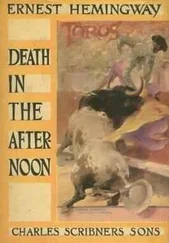'Maybe they'll have pictures of Miss Bergman. Do you still want to be like her?'
'Not any more,' the girl said. 'I want to be like me only much, much better and I want to have you love me.'
'Also,' she said suddenly and un–maskingly, 'I want to be like you. Can I be like you a little while to–night?'
'Of course,' the Colonel said. 'In what town are we anyway?'
'Venice,' she said. 'The best town, I think.'
'I quite agree. And thank you for not asking me for more war episodes.'
'Oh, you are going to have to tell them to me later.'
' Have to ?' the Colonel said, and the cruelty and resolution showed in his strange eyes as clearly as when the hooded muzzle of the gun of a tank swings towards you.
'Did you say have to , Daughter?'
'I said it. But I did not mean it in that way. Or, if I did wrong, I am sorry. I meant will you please tell me more true episodes later? And explain me the things I do not understand?'
'You can use have to if you want, Daughter. The hell with it.'
He smiled and his eyes were as kind as they ever were, which was not too kind, as he knew. But there was nothing now that he could do about it except to try to be kind to his last and true and only love.
'I don't really mind, Daughter. Please believe me. I know about command and, at your age, I used to take considerable pleasure in exercising it.'
'But I don't want to command,' the girl said. In spite of her resolution not to cry, her eyes were wet. 'I wish to serve you.'
'I know. But you wish to command, too. There's nothing wrong in that. All people such as us have it.'
'Thank you for the such as us.'
'It wasn't hard to say,' the Colonel said. 'Daughter,' he added.
Just then the concierge came to the table and said, 'Excuse me, my Colonel. There is a man outside, I believe he is a servant of yours, my lady, with quite a large package which he says is for the Colonel. Should I keep it in the storeroom or have it sent to your room?'
'To my room,' the Colonel said.
'Please,' the girl said. 'Can't we look at it here? We don't care about anyone here, do we?'
'Have it unwrapped and brought in here.'
'Very good.'
'Later, you may have it taken with great care to my room and have it wrapped, solidly, for transport at noon to–morrow.'
'Very good, my Colonel.'
'Are you excited to see it?' the girl asked.
'Very,' said the Colonel. ' Gran Maestro , some more of that Roederer, please, and please place a chair in such a position that we may view a portrait. We are devotees of the pictorial arts.'
'There's no more Roederer cold,' the Gran Maestro said. 'But if you would like some Perrier–Jouet―'
'Bring it,' the Colonel said and added, 'Please.'
'I don't talk like Georgie Patton,' the Colonel told her. 'I don't have to. And besides he's dead.'
'Poor man.'
'Yes. Poor man all his life. Although quite rich in money and with a lot of armour.'
'Do you have anything against armour?'
'Yes. Most of the people inside of it. It makes men into bullies which is the first step towards cowardice; true cowardice, I mean. Perhaps it is a little complicated by claustrophobia.'
Then he looked at her and smiled and regretted taking her beyond her depth, as you might take a new swimmer on a shallow, shelving beach, into too deep water; and he sought to reassure her.
'You forgive me, Daughter. Much of what I say is unjust. But it is truer than the things that you will read in Generals' memoirs. After a man gets one star, or more, the truth becomes as difficult for him to attain as the Holy Grail was in our ancestors' time.'
'But you were a general officer.'
'Not for too damn long,' the Colonel said. 'Now captains,' the General said, 'they know the exact truth and they can mostly tell it to you. If they can't, you reclassify them.'
'Would you reclassify me if I lied?'
'It would depend on what you lied about.'
'I'm not going to lie about anything. I don't want to be reclassified. It sounds horrible.'
'It is,' the Colonel said. 'And you send them back to have it done to them with eleven different copies of why it should be done, every one of which you sign.'
'Did you reclassify many?'
'Plenty.'
The concierge came into the room with the portrait, carrying it in its big frame, much as a ship moves when she is carrying too much sail.
'Get two chairs,' the Colonel said to the second waiter, 'and put them there. See that the canvas does not touch the chairs. And hold it so it does not slip.'
Then to the girl he said, 'We'll have to change that frame.'
'I know,' she said. 'It was not my choice. Take it unframed with you and we'll choose a good frame next week. Now look at it. Not at the frame. At what it says, or does not say, of me.'
It was a beautiful portrait; neither cold, nor snobbish, nor stylized, nor modern. It was the way you would want your girl painted if Tintoretto were still around and, if he were not around, you settled for Velasquez. It was not the way either of them painted. It was simply a splendid portrait painted, as they sometimes are, in our time.
'It's wonderful,' the Colonel said. 'It is truly lovely.'
The concierge and the second waiter were holding it and looking at it around the edges. The Gran Maestro was admiring fully. The American, two tables down, was looking at it with his journalistic eyes, wondering who painted it. The back of the canvas was to the other diners.
'It is wonderful,' the Colonel said. 'But you can't give me that.'
'I already have,' the girl said. 'I'm sure my hair was never that long over my shoulders.'
'I think it probably was.'
'I could try to let it get that long if you want.'
'Try,' the Colonel said. 'You great beauty you. I love you very much. You and you portrayed on canvas.'
'Tell the waiters if you like. I'm sure it won't come as a great shock to them.'
'Take the canvas upstairs to my room,' the Colonel said to the concierge. 'Thank you very much for bringing it in. If the price is right, I am going to buy it.'
'The price is right,' the girl said to him. 'Should we have them take it and the chairs down and make a special showing of it for your compatriot? The Gran Maestro could tell him the address of the painter and he could visit the picturesque studio.'
'It is a very lovely portrait,' the Gran Maestro said. 'But it should be taken to the room. One should never let Roederer or Perrier–Jouet do the talking.'
'Take it to the room, please.'
'You said please without a pause before it.'
'Thank you,' the Colonel said. 'I am very deeply moved by the portrait and I am not entirely responsible for what I say.'
'Let's neither of us be responsible.'
'Agreed,' the Colonel said. 'The Gran Maestro is really very responsible. He always was.'
'No,' the girl said. 'I think he did not only from responsibility but from malice. We all have malice, you know, of some kind or another in this town. I think perhaps he did not want the man to have even a journalist's look into happiness.'
'Whatever that is.'
'I learned that phrase from you and now you have re–learned it back from me.'
'That's the way it goes,' the Colonel said. 'What you win in Boston you lose in Chicago.'
'I don't understand that at all.'
'Too hard to explain,' the Colonel said. Then, 'No. Of course it isn't. Making things clear is my main trade. The hell with being too hard to explain. It is like professional football, calcio . What you win in Milano you lose in Torino.'
'I don't care about football.'
'Neither do I,' the Colonel said. 'Especially not about the Army and Navy game and when the very high brass speaks in terms of American football so they can understand, themselves, what they are talking of.'
Читать дальше
Конец ознакомительного отрывка
Купить книгу












